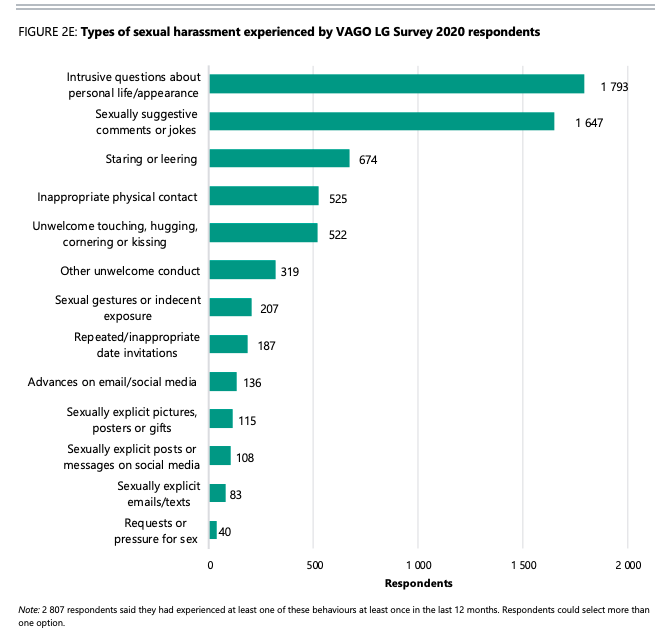
Victorian councils are failing to provide workplaces that are free from sexual harassment, according to report that found more than one in four respondents have been sexually harassed in the last 12 months.
The Victorian Auditor General’s Office says councils have tools to prevent harassment, such as policies, procedures and training, but aren’t using them to their full advantage or engaging with staff to address the issue.
As a result, victims lack confidence to report their experiences and when they do, they are not being supported or encouraged.
In our survey we found sexual harassment happens in every councils across all roles and levels.
VAGO
“In our survey we found sexual harassment happens in every councils across all roles and levels,” VAGO says.
“Councils aren’t doing enough to understand the prevalence and nature of sexual harassment in their workplaces.”
Intrusive questions and jokes
VAGO audited five councils and surveyed nearly 10,000 council employees and councillors from across the sector.
The audit found 2,807 respondents, or 28 per cent had experienced harassment, including 42 per cent of women between 18 and 34.
Aboriginal and Torres Strait Islanders and LGBT people were also at increased risk.
The most common forms of harassment include intrusive questions about a person’s personal life and sexually suggestive comments or jokes, followed by staring or leering.

Ninety per cent of the harassment occurred in the course of day-to-day work.
Forty-three per cent of respondents pretended it didn’t bother them and 37 per cent said they laughed it off. Only 10 per cent told their manager and just two per cent made a formal complaint.
Harassers were most commonly co-workers at the same or a more senior level.
Employees in customer-facing roles such as aged care workers, library staff and pool attendants were also at risk of harassment by members of the public.
Sexual harassment can cost councils
The report found the audited councils didn’t regularly collect information through surveys or complaint registers, and four of the five didn’t have standalone sexual harassment policies.
VAGO also found poor record keeping and a failure by councils to say why they stopped investigating complaints.
“This sends a message to victims that councils don’t take their complaints seriously and puts councils at risk if employees challenge their decisions,” the report says.
The auditor warns that sexual harassment can be costly to councils, exposing them to legal liability and high staff turnover.
The report makes eleven recommendations including the establishment of regular data collection within Local Government Victoria to measure the extent of sexual harassment in the sector.
Associate Secretary of the Department of Jobs, Precincts and Regions Penelope McKay said the government would begin discussions with local governments by next March on developing a methodology for collecting data on sexual harassment.
Comment below to have your say on this story.
If you have a news story or tip-off, get in touch at editorial@governmentnews.com.au.
Sign up to the Government News newsletter
Most read
Scathing report finds little has changed at PwC
Qld council welcomes progress on massive battery system
Inquiry to consider how federal govt can address councils’ sustainability issues
‘Local’ procurement turns out not to be so local, committee hears
Another report finds local government falling down on cyber security